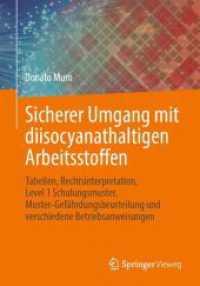- ホーム
- > 洋書
- > ドイツ書
- > Humanities, Arts & Music
- > Psychology
Full Description
This study assesses the long-term psychological consequences after the 2004 Asian tsunami in Kerala, India. Participants are the inhabitants of Kerala's coastal regions. The results indicated that the participants who were affected by the tsunami showed significantly greater psychological distress and symptoms of post-traumatic stress disorder (PTSD) than a control group. In addition, it could be shown that protective factors, such as perceived social support, certain coping strategies, and a sense of coherence, could decrease the level of symptoms. Perceived social support, in particular, decreased symptoms of post-traumatic stress disorder and a strong sense of coherence mitigated psychological distress. Avoidance coping was found to be more effective in decreasing levels of traumatic stress in this non-industrialized, collectivistic cultural setting.
Contents
Contents: Tsunami in Kerala - Description of Post-Traumatic Stress Disorder (PTSD) - Etiology of PTSD - Risk Factors and Predictors of PTSD - Sense of Coherence - Approach and Avoidance Coping - Perceived Social Support - Collectivistic Cultural Setting - Description of the Methods and Results of the Study.








